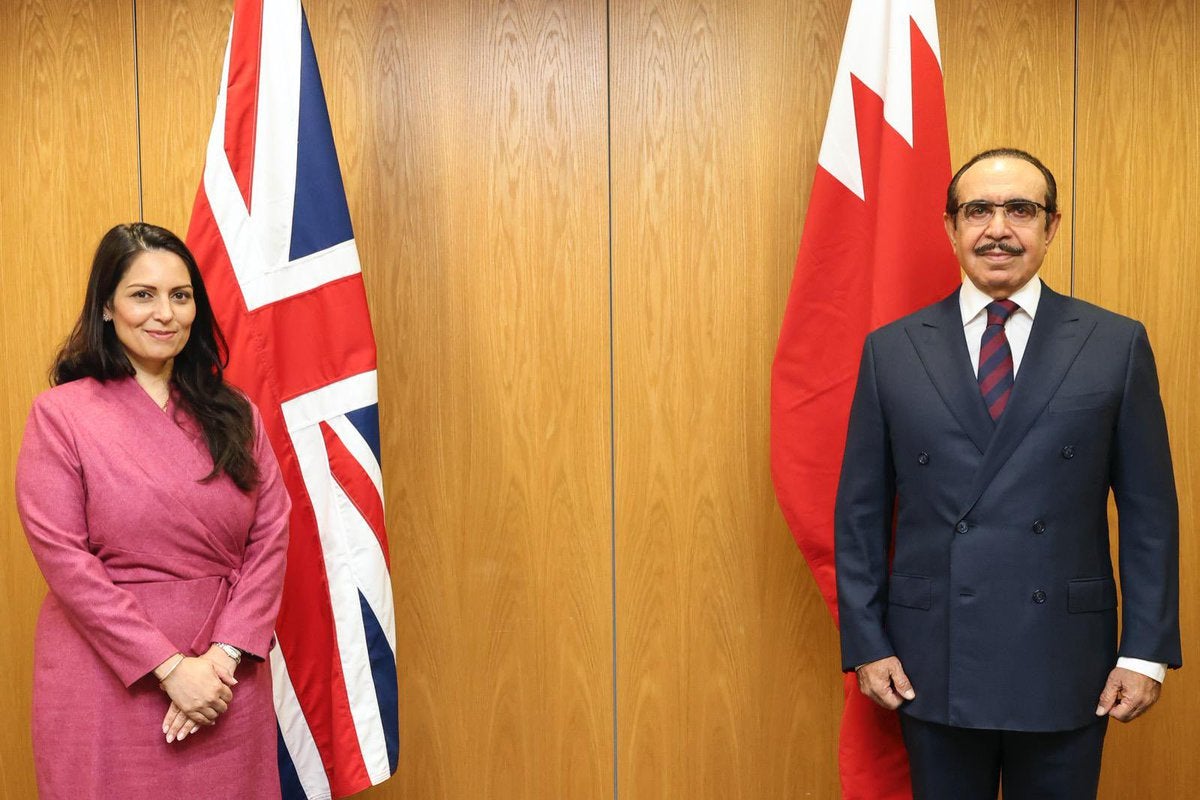Revealed: Priti Patel’s links to Bahrain minister blamed for ‘torture’ of political prisoners
Exclusive: UN condemned Gulf state for ‘violation of international law’ – but interior minister invited to Home Office talks

Priti Patel hosted a meeting with a Bahrain minister blamed for the recent “torture” of political prisoners, triggering claims that she is “whitewashing abuse” in the country.
MPs are demanding an aid ban on the repressive Gulf state over the violence, condemned by the UN high commissioner for human rights as a “violation of international law”.
It followed allegations of multiple other human rights breaches, including evidence that detained children as young as 13 are beaten and threatened with rape.
Yet, despite the “abhorrent” alleged abuse, the home secretary invited General Shaikh Rashid bin Abdullah Al Khalifa, Bahrain’s interior minister, to talks this week to discuss “security matters and topics of mutual interest”.
The meeting came after The Independent revealed that Ms Patel toured a notorious police department in Bahrain where activists – including a man granted asylum in the UK – were allegedly tortured and sexually assaulted.
Andrew Gwynne, a senior Labour MP, said he had written to Boris Johnson to protest against Ms Patel’s 25 May meeting, describing it as “incredibly insulting to the victims of these abuses”.
Sayed Ahmed Alwadaei, director of the human rights group Bahrain Institute for Rights and Democracy (Bird), said the encounter showed the UK was willing to “tolerate human rights abuses, as long as they are committed by allied states”.
And Jeed Basyouni, from the organisation Reprieve, said: “It is so disturbing to see the UK government advertising its partnership with Bahrain like this, when it knows full well that the regime systematically uses torture and death sentences to suppress dissent.”
Since violently crushing a pro-democracy protest movement in 2011, the island’s monarchy has been condemned for cracking down on civil liberties and dismantling political opposition.
But the UK government has continued to provide security advice, resisting calls to end the arrangement on the grounds that it needs support to “head in a positive direction”.
Just last month, there was what a parliamentary motion tabled by MPs calls “a violent attack against over 60 political prisoners by Bahraini police at Jau Prison”.
The motion notes: “Minister Al Khalifa has overseen the systematic persecution of human rights defenders, journalists and activists in Bahrain and the terrorising of civil society since at least 2011.”
Campaigners are alarmed by Ms Patel’s close links with the Bahraini government, but are also fiercely critical of the UK’s ambassador to the island nation, Roderick Drummond.
After the prison attacks on 17 April – involving “egregious torture”, say MPs – families of inmates who were feared to have disappeared appealed to Mr Drummond for help finding their missing relatives.
The UN condemned “disproportionate force”, noting witnesses had reported that “special forces threw stun grenades and beat detainees on their heads”.
But the ambassador then visited the prison, describing it as “a well-run facility, with good medical provision” and praising Bahrain for being “more transparent”.
Mr Drummond was accused of ignoring letters about the disappeared people and pleas to speak with their families.
Mr Gwynne added: “The human rights abuses being perpetrated in Bahrain are abhorrent. It is unacceptable that the government haven’t applied sanctions or even publicly condemned the abuse.”
However, the Home Office believes no purpose is served in criticising Bahrain publicly because it is seen as a vital security partner in the Middle East, but is unable to point to any “reform” achieved.
Asked about the criticism of Ms Patel’s meeting with the interior minister, a Home Office spokesperson said: “The government is committed to supporting Bahrain as it continues to make important security, police and justice reforms, and we will continue work closely together to promote security and stability in the Gulf region and across the world.”
Join our commenting forum
Join thought-provoking conversations, follow other Independent readers and see their replies
Comments
Bookmark popover
Removed from bookmarks